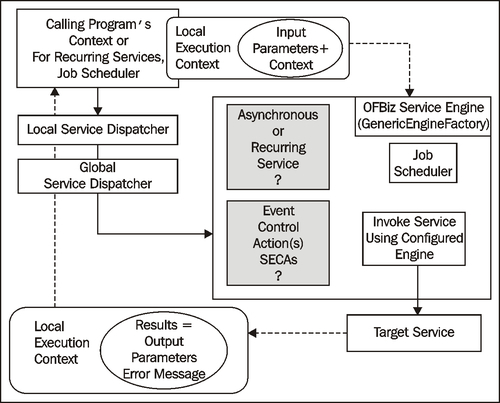In this chapter, we explore the following OFBiz Service topics:
- Managing OFBiz Services
- Calling asynchronous, synchronous, and recurring Services from an HTML form
- Creating a Service definition file
- Creating a Service definition
- Service implementation
- Defining Service input and output attributes
- Service Event Condition Actions (SECAs)
- Service groups
- Handling Service errors
- Implementing Groovy Services
- Mail Event Condition Actions (MECAs)
- Entity Event Condition Actions (EECAs)
OFBiz has been characterized as having an "event-driven, service-oriented architecture". Long before it was fashionable to build complex enterprise computer systems using service-oriented techniques, OFBiz implemented a number of architectural features enabling a service-oriented design. These features include:
- A context-aware Service Engine available for use across the entire framework or, if configured, externally through supported network interfaces. OFBiz Service consumers need not concern themselves with the location of the called Service nor with a Service's implementation details. OFBiz handles all that transparently to both the service provider and consumer.
- Multiple invocation methods including: inline or synchronous with the calling program; out-of-band or asynchronous from the caller's processing logic and/or as a scheduled job for recurring execution. OFBiz handles all input, output, and context parameter transfers seamlessly to both Service provider and Service caller.
- Chaining of Services for a true, event-driven Service platform and implementation of complex workflows. Services may be configured to be invoked based on external events or triggers. Once triggered, an OFBiz Service may call other Service(s) based on additional triggering Events and/or conditions. Any combination of Services may be chained together to form Service Event Condition Action(s) or SECAs.
- A fully integrated job scheduler for recurring and single use asynchronous job scheduling. The OFBiz job scheduler handles all the mundane coordination tasks associated with job scheduling, including calendar lookups, frequency, and interval timing.
- Service creation and implementation tools, including selectable input and output validations based on configured parameter types; authentication and authorization checks integrated with OFBiz user login processing, and even localization preservation across Service calls.
The heart of the OFBiz service-oriented implementation is the Service Engine factory. Using a factory pattern, OFBiz provides an easily extendable Service management and invocation tool supporting any number of concurrent Services and any number of third-party execution engines including, but not limited to: Java, Groovy, Javascript, JPython, and the OFBiz "simple" Service (based on the OFBiz Mini-Language.) By offloading Service implementation to programming language-specific engines, OFBiz Services may be written and implemented in any language that suits the developer's fancy.
The Service Engine factory may be called from anywhere in the framework to handle the details of Service invocation, as shown in the following diagram:

